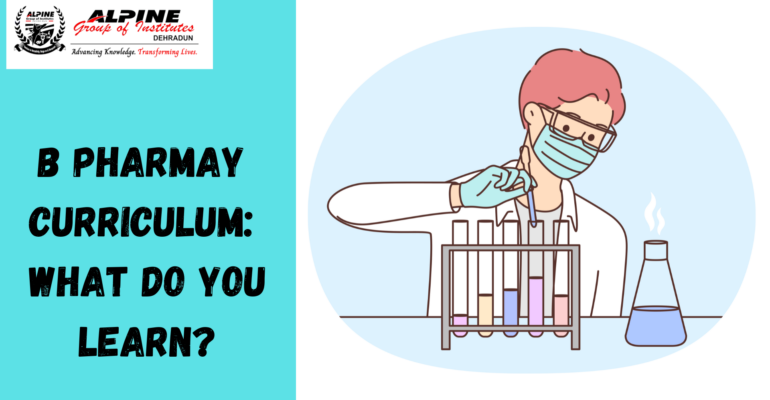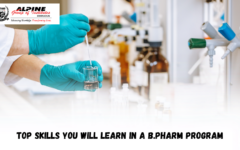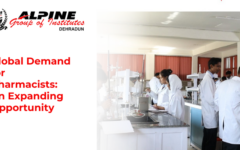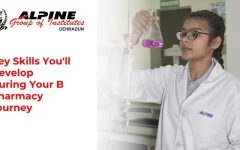B Pharmacy Curriculum: What Do You Learn?
2025-01-07 9:36B Pharmacy Curriculum: What Do You Learn?
The B Pharmacy (Bachelor of Pharmacy) curriculum is designed to provide students with a comprehensive understanding of pharmaceutical sciences, including drug development, drug action, pharmacology, and the role of pharmacists in healthcare. The course typically spans 4 years, with each year focusing on different aspects of pharmacy education. Here’s a breakdown of what you’ll learn during your B Pharmacy course:
Year 1: Foundation of Pharmaceutical Sciences
In the first year, students are introduced to basic sciences and foundational subjects that are essential for understanding the field of pharmacy.
Key Subjects:
- Pharmaceutical Chemistry I
- Study of the fundamentals of chemistry, including organic and inorganic chemistry.
- Introduction to the structure, properties, and synthesis of drugs.
- Human Anatomy and Physiology
- Overview of the structure and functions of the human body.
- Study of organ systems (cardiovascular, respiratory, digestive, nervous, etc.) and how they relate to drug action.
- Biochemistry
- Basic biochemistry, including the study of macromolecules (proteins, lipids, carbohydrates, nucleic acids).
- Focus on metabolic pathways and how biochemistry relates to pharmacology.
- Pharmacognosy I
- Introduction to natural sources of drugs (plants, animals, microorganisms).
- Study of plant and herbal drugs, including their therapeutic uses.
- Pharmaceutical Microbiology
- Basic principles of microbiology and their relevance to pharmacy practice.
- Focus on microorganisms (bacteria, fungi, viruses) and how they interact with pharmaceutical products.
- Pharmaceutical Mathematics
- Application of mathematical principles to the preparation and calculation of drug dosages, concentrations, and formulation.
- Dispensing Pharmacy
- Basic skills in dispensing medications.
- Preparation and compounding of medicines in pharmacies.
Year 2: In-Depth Study of Pharmaceutical Sciences
In the second year, the course delves deeper into subjects that help students develop more specialized knowledge in pharmaceuticals.
Key Subjects:
- Pharmaceutical Chemistry II
- Advanced study of organic chemistry with a focus on the chemistry of medicinal compounds.
- Techniques in drug synthesis and design.
- Pharmacology I
- Study of how drugs interact with biological systems.
- Focus on drug action, therapeutic uses, side effects, and toxicity.
- Pharmaceutics I
- Introduction to pharmaceutical dosage forms (tablets, capsules, injections, etc.).
- Study of drug formulation, preparation, and packaging.
- Pharmacognosy II
- Further study of natural products used as medicines.
- Focus on identification, extraction, and standardization of medicinal plants.
- Pharmaceutical Jurisprudence
- Laws, regulations, and ethical standards governing pharmacy practice.
- Study of drug licensing, pharmaceutical ethics, and drug control policies.
- Health Education and Community Pharmacy
- Focus on educating the public about health issues and the role of the pharmacist in community health.
- Prevention and management of common diseases and health conditions.
Year 3: Advanced Pharmaceutical Sciences
The third year of the B Pharmacy course is more focused on specialized and advanced topics related to drug formulation, pharmacology, and clinical practices.
Key Subjects:
- Pharmacology II
- Advanced study of pharmacodynamics (how drugs affect the body) and pharmacokinetics (how the body processes drugs).
- In-depth understanding of drug interactions, toxicity, and therapeutic drug monitoring.
- Pharmaceutics II
- Study of complex pharmaceutical dosage forms (suspensions, emulsions, aerosols, etc.).
- Advanced topics in drug delivery systems like controlled-release formulations, transdermal systems, etc.
- Biopharmaceutics and Pharmacokinetics
- Study of how the body absorbs, distributes, metabolizes, and excretes drugs.
- Focus on bioavailability, bioequivalence, and drug absorption mechanisms.
- Pharmaceutical Analysis
- Techniques used to analyze drugs, including spectrophotometry, chromatography, and electrophoresis.
- Study of analytical methods for quality control in drug manufacturing.
- Clinical Pharmacy
- Focus on the role of pharmacists in healthcare settings like hospitals.
- Monitoring and optimizing drug therapy in patients, working closely with doctors, nurses, and other healthcare professionals.
- Medicinal Chemistry
- Advanced study of the chemistry of drugs, including the chemical structure-activity relationship (SAR).
- Design and synthesis of new drugs.
Year 4: Specialized Topics and Practical Experience
In the final year, students specialize further, integrating theoretical knowledge with practical experience. Emphasis is placed on research, industrial pharmacy, and real-world pharmacy practice.
Key Subjects:
- Pharmaceutical Technology
- Study of the technology behind drug production and manufacturing processes.
- Focus on pharmaceutical equipment, production techniques, and quality control systems.
- Pharmacovigilance
- Study of drug safety, including monitoring adverse drug reactions (ADR) and post-market surveillance.
- Techniques for ensuring drugs are safe and effective for long-term use.
- Regulatory Affairs
- Understanding of drug regulations and standards set by governing bodies like the FDA, WHO, and local regulatory agencies.
- Focus on the approval process for new drugs, clinical trials, and post-market surveillance.
- Research Methodology in Pharmacy
- Training in research design, data collection, and analysis methods.
- Students may work on a research project, culminating in a dissertation or thesis.
- Industrial Pharmacy
- Study of the pharmaceutical industry, including drug manufacturing, marketing, and sales.
- Focus on good manufacturing practices (GMP) and quality assurance.
- Internship/Project Work
- Students are usually required to undertake a 6-8 week internship in a pharmaceutical company, hospital, or community pharmacy.
- Practical experience in various pharmacy settings, where students can apply their knowledge and develop professional skills.
Overall Learning Outcome of the B Pharmacy Course
By the end of the B Pharmacy course, students will have:
- In-depth knowledge of pharmaceutical sciences, including drug chemistry, pharmacology, pharmacognosy, pharmaceutics, and drug regulatory affairs.
- Practical skills in drug formulation, dispensing, patient counseling, and pharmaceutical research.
- Hands-on experience through internships, research projects, and exposure to the pharmaceutical industry.
- A solid foundation for higher education (M Pharm, MBA, or PhD) or professional practice as a pharmacist.
The B Pharmacy curriculum provides a well-rounded education for those seeking a career in the rapidly evolving healthcare and pharmaceutical industries, equipping students with both the technical knowledge and practical skills needed to succeed.








